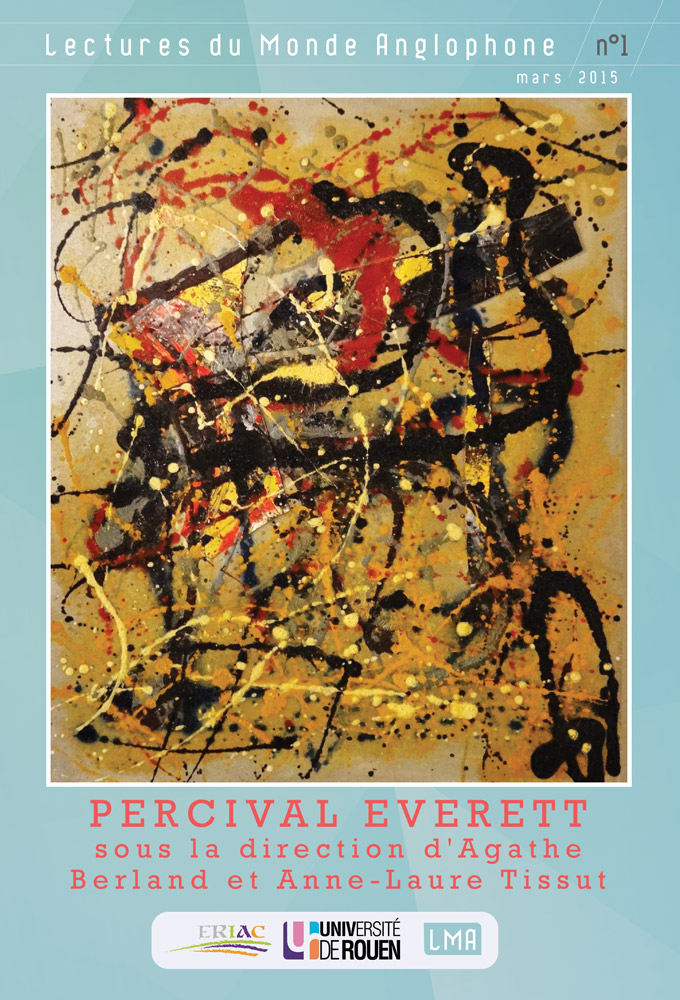Sommaire
1 | 2015
Percival Everett
Ce volume recueille les communications présentées lors du colloque international « Percival Everett » organisé par l’équipe, à l’initiative d’Agathe Berland et d’Anne-Laure Tissut, en mars 2013 à la Maison de l’Université de Mont-Saint-Aignan.Textes recueillis par Agathe Berland et Anne-Laure Tissut, et mis en forme par Sarah Boulet. This volume gathers the papers given at the international conference “Percival Everett” organised by the ERIAC research center and managed by Agathe Berland and Anne-Laure Tissut, that took place in March 2013 at the Maison de l’Université in Mont-Saint-Aignan.Texts collected by Agathe Berland and Anne-Laure Tissut, and finalized for publication by Sarah Boulet.

- Anne-Laure Tissut Introduction
- Keith B. Mitchell Encountering the Face of the Other: Levinasian Ethics and Its Limits in Percival Everett’s God’s Country
- Marguerite Déon Clichés and cultural icons in Percival Everett’s fiction
- Anthony Stewart Talking About Race, Exposing The Desire for the Post-Racial, and Percival Everett’s Assumption
- Claude Julien Assumption: from reminiscences to surprise, from dream to nightmare
- Isabelle Van Peteghem-Tréard Jouissance in Damnedifido stories by Percival Everett
- Clément-Alexandre Ulff Invisible Fathers: Investigating Percival Everett’s “Lower Fresquencies”
- Michel Feith The Well-Tempered Anachronism, Or The C(o)urse of Empire in Percival Everett’s For Her Dark Skin
- Judith Roof Everett’s Eidolon: The Story of an Eye
- Brigitte Félix “Of weeds and words: Percival Everett’s poetry”
- Claudine Raynaud Naming, Not Naming and Nonsense in I am Not Sidney Poitier
- Françoise Sammarcelli Vision and Revision in Percival Everett’s Erasure
- Marie-Agnès Gay "Wanted: straight words" in Percival Everett’s novel Wounded
- Sylvie Bauer “Private Terbulent Seas”: “painting The Moon” In Cutting Lisa, By Percival Everett
- Gwen Le Cor “At any rake,” angles of “linguistic condensation” and shock in Percival Everett’s The Water Cure: “All this while we play and pain with a language that is private.”
1 | 2015
Invisible Fathers: Investigating Percival Everett’s “Lower Fresquencies”
Clément-Alexandre Ulff
I propose to study the unique characterization of fathers and father figures in Percival Everett’s fiction. From Suder (1983), the author’s first published novel, to the freshly released Percival Everett by Virgil Russell (2013), fatherhood is arguably a central theme in the author’s oeuvre. Surprisingly, it has been virtually absent from any criticism on the author. Using Ralph Ellison’s unnamed narrator in Invisible Man as the ancestral point of origin of a “disembodied voice” addressing his readers on “lower frequencies”, I will trace that voice up through the trope of the oxymoronic invisible presence of fathers in Everett’s work, and their diegetic and spiritual functions for lost son and daughter characters.
Ce texte n’a pas encore fait l’objet d’une rétroconversion en XML, mais il peut être consulté dans sa version PDF.

Ce(tte) œuvre est mise à disposition selon les termes de la Licence Creative Commons Attribution - Pas dUtilisation Commerciale - Partage dans les Mêmes Conditions 4.0 International. Polygraphiques - Collection numérique de l'ERIAC EA 4705
URL : https://publis-shs.univ-rouen.fr/eriac/519.html.
Quelques mots à propos de : Clément-Alexandre Ulff
Université de Versailles-Saint-Quentin
Clément-Alexandre Ulff teaches at Rouen University as an ATER. He is currently preparing a PhD at Versailles-Saint-Quentin University, entitled “L’invention de l’Amérique dans l’œuvre de Philip Roth”, an author on whose work he already published several papers with the Presses Universitaires de Rennes, in volumes edited by Professor Paule Lévy. His research focuses on ethnic and metafictional writing.
